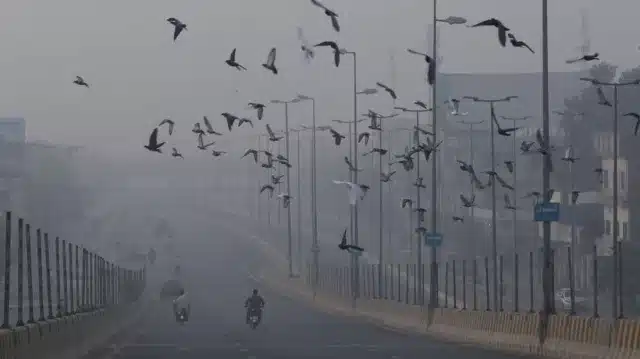LAHORE: Declaring a health emergency in Lahore and Multan, senior Punjab Minister Marriyum Aurangzeb said that smog had escalated to the status of a national disaster and it was adversely affecting other districts in the province also.
Addressing a press conference on smog, she noted that fog had also merged with smog this season, causing health hazards.
“The absence of fog during other times of the year often conceals the presence of smog,” she remarked.
Referring to the 10-year anti-smog plan initiated in March by Chief Minister Maryam Nawaz Sharif, the senior minister said that all departments had been given specific targets to combat the menace.
She recently met members of the Supreme Court’s Smog Commission to discuss ongoing efforts, expressing her intention to personally brief the judiciary.
Aurangzeb highlighted the health issues posed by smog, citing the World Health Organisation’s recommendations, which the government has been implementing for the past eight months.
Additional gaps will be addressed to ensure that sectoral targets are achieved.
Agricultural interventions: For the first time, the agriculture department has provided 1,000 super seeders to the farmers at a 60pc subsidy.
These are now available for rental use.
Technological solutions: Initiatives such as the Air Quality Index (AQI), mass transit programmes, and bio-refineries are underway.
Factories are being assisted with emission control systems through subsidised loans.
Industrial regulation: 800 brick kilns have been demolished, and efforts to expand Lahore”s forest cover are ongoing.
Vehicle fitness: Three vehicle fitness certification stations have been established at Kala Shah Kaku and Thokar Niaz Baig.
Analysers for smoke detection have been provided to traffic police, while the Environmental Protection Agency (EPA) has been equipped with surveillance system and environmental technology.
Appeals to citizens and media: The minister appealed to journalists and citizens to actively support the government’s efforts against smog.
She stressed the importance of public cooperation and highlighted that constructive criticism provides valuable insights for improvement.
Health Precautions: A health emergency has been declared in Lahore and Multan, with extended outpatient department (OPD) hours until 8 PM.
Hospitals have been provided with essential medicines for respiratory illnesses and ambulances have been equipped with breathing apparatus.
School and office adjustments: Schools in Punjab will observe extended holidays, while universities and higher secondary institutions transition to online classes.
Private and government offices will operate with 50pc staff working from home.
Construction ban: Construction activities in Lahore and Multan are suspended for 10 days due to fugitive dust concerns, with restrictions on the transport of construction materials at entry points.
Weekend lockdowns and SOPs: A complete lockdown will be enforced in Lahore and Multan on Fridays, Saturdays, and Sundays.
Restaurants will be limited to takeaway services after 4 pm.
Compliance with Standard Operating Procedures (SOPs) will be crucial for construction projects to resume.
Public campaigns and monitoring: Aurangzeb announced a Detox Campaign encouraging participation from citizens, artists, and media.
Citizens are urged to report violations via the Green App and hotline 1373. Smog-related data will guide future actions, and additional monitoring equipment is being procured.
She stressed that smog is a life-threatening issue and urged all stakeholders to work collectively.
Political rivalry has no place in addressing this crisis.
The government is also working to expand green cover under an international-standard ‘Green Master Plan.
Aurangzeb concluded by highlighting the significance of collaborative efforts, urging citizens to adhere to preventive measures such as mask-wearing and reduced motorcycle use.
She appealed to all segments of society to contribute a sustainable solution for smog management, emphasizing that this is a matter of human lives, not politics.

